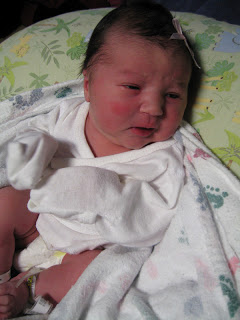Women in my family tend to give birth quickly. Sometimes it happens so fast it has its own medical term, precipitous labor, meaning that labor lasts three hours or less.
Precipitous labor is mostly unheard of with a first pregnancy, but it becomes more common with repeated pregnancies. Mothers are at greater risk of tearing during a precipitous delivery, and babies are more at risk for fetal distress or head injuries. Labor’s onset is often sudden and strong. The experience can be intense, and mothers may have difficulty coping with the pain, especially because there often isn’t time to administer pain medication.
In my family, my maternal grandmother, mother, and I all gave birth to our first babies in eight to nine hours.
My grandmother’s second baby was born in four hours, and her third was born in two hours.
My mother is the most impressive. Her second and third babies were born in two hours. One minute she was feeling fine with no signs of imminent delivery, and two hours later she was holding a baby in her arms.
Mom recounts the story of her second labor, when she and my dad were getting ready to leave for the hospital but my grandfather, a retired minister, insisted on praying with them first. Mom is a devout Christian, but she sensed things were going to happen fast and confessed all she could think about was getting out the door.
My mom talks about how forceful her third birth felt, and she believes the experience left my sister with a headache for the first day or so of life.
These were the scenarios swirling around in my head last fall when I was expecting daughter number two. I was moderately terrified at the prospect that I might take after my mother and have a two-hour labor, mostly because I knew there would be no time for pain relief. Labor with daughter number one was intense, with one contraction rolling into the next with hardly a break between. It got worse when the doctor ordered my water to be artificially ruptured; I later learned this was probably the reason why things got so intense so quickly. I got my epidural when I was six centimeters dilated. I dreaded the idea of what lay beyond six centimeters.
I was doubly anxious about going into labor in the middle of a weekday when my husband was at work, teaching in a high school social studies classroom. He promised he could leave quickly once he got the call, but I knew he couldn’t just walk out and leave his class unattended. He’d have to wait a few minutes for someone to relieve him.
The time it would take for him to get out of the building, drive home, and drive us to the hospital could easily be one hour, depending on traffic and the time of day. I could be halfway through a two-hour labor by the time I staggered through the hospital doors.
During my 38-week checkup, my doctor asked if I wanted an induction the following week, so I “wouldn’t have the baby on the side of the highway.” Inductions are considered a way to “control” labor in women with a history of fast labors.
“What are the chances I’m going to have this baby in two hours like my mom?” I asked.
“There’s no way to know,” she said, adding with a smile, “but other moms would love it if you could bottle up what you’ve got and sell it.” She also advised me not to waste time if I had the slightest inkling I might be in labor.
My husband encouraged me to schedule the induction to put an end to my worried murmurings. My mom discouraged potentially risky medical intervention.
I took several days to decide. I opted not to be induced, partly because some inductions fail to progress and require caesarean deliveries, and partly because I was curious to see how my labor would progress on its own.
As it was, labor started around 2:30 in the morning one day late last October. It took ten to fifteen minutes to determine I was really in labor, a few minutes to throw on clothes and let in our friend who was going to stay with our older daughter, and it was 3:30 a.m. by the time we reached the hospital. By then I suspected it was not going to be a two-hour show. But I still told the nurses who checked me in that my labor might progress quickly and that I wanted someone at the ready to administer an epidural.
I got the epidural just before 5 a.m. when I was about eight to nine-ish centimeters dilated (it’s amazing how much more manageable labor is when no one artificially breaks your water) and delivered my daughter at precisely 7:26 a.m. The entire thing was about five hours. It likely would have been four hours without an epidural, because they allowed me to rest while the baby moved down.
While I was pushing, a nurse commented, “This is how birth should be: no inductions, an epidural, just a few hours.” It was as ideal a scenario as I could have asked for.
Given my family history and my own track record with labor, though, I suspect things will go the precipitous route if I ever have a third baby. The experience will be intense but we moms can survive anything for just an hour or two, right? At least that’s what I’ll tell myself.
Let’s connect on social media too:
Mumbling Mommy on Facebook
Mumbling Mommy on Twitter
Mumbling Mommy on Pinterest
Category: BabiesTags: birth









